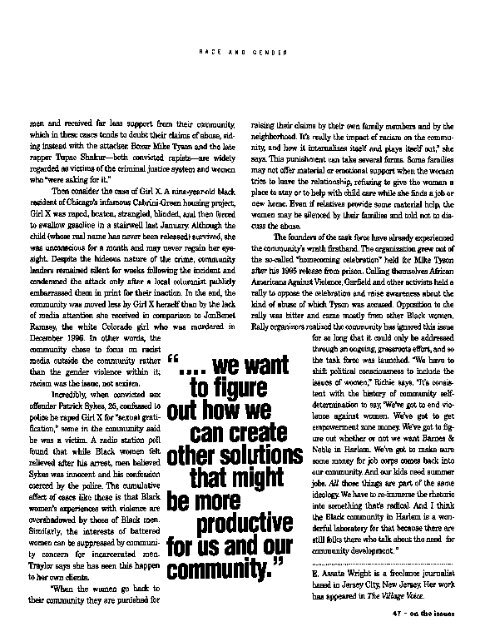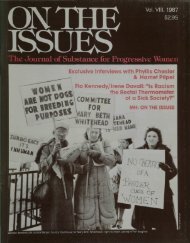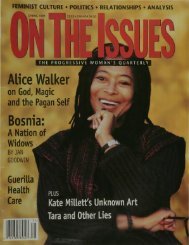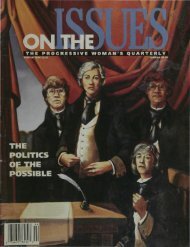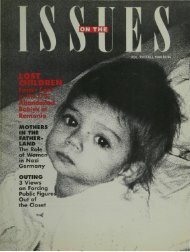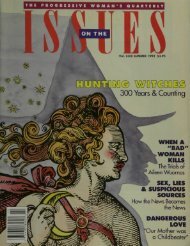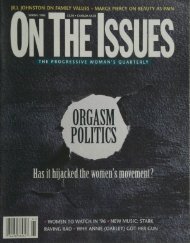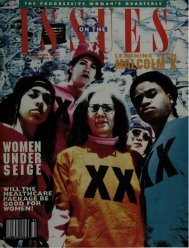women histories, incest sexual abuse. institutionalized. But what if ...
women histories, incest sexual abuse. institutionalized. But what if ...
women histories, incest sexual abuse. institutionalized. But what if ...
Create successful ePaper yourself
Turn your PDF publications into a flip-book with our unique Google optimized e-Paper software.
men and received far less support from their community,<br />
which in these cases tends to doubt their claims of <strong>abuse</strong>, siding<br />
instead with the attacker. Boxer Mike Tyson and the late<br />
rapper Tupac Shakur—both convicted rapists—are widely<br />
regarded as victims of the criminal justice system and <strong>women</strong><br />
who "were asking for it."<br />
Then consider the case of Girl X. A nine-year-old black<br />
resident of Chicago's infamous Cabrini-Green housing project,<br />
Girl X was raped, beaten, strangled, bunded, and then forced<br />
to swallow gasoline in a stairwell last January. Although the<br />
child (whose real name has never been released) survived, she<br />
was unconscious for a month and may never regain her eyesight.<br />
Despite the hideous nature of the crime, community<br />
leaders remained silent for weeks following the incident and<br />
condemned the attack only after a local columnist publicly<br />
embarrassed them in print for their inaction. In the end, the<br />
community was moved less by Girl X herself than by the lack<br />
of media attention she received in comparison to JonBenet<br />
Ramsey, the white Colorado girl who was murdered in<br />
December 1996. In other words, the<br />
community chose to focus on racist<br />
media outside the community rather<br />
than the gender violence within it;<br />
racism was the issue, not sexism.<br />
Incredibly, when convicted sex<br />
offender Patrick Sykes, 25, confessed to<br />
police he raped Girl X for "<strong>sexual</strong> grat<strong>if</strong>ication,"<br />
some in the community said<br />
he was a victim. A radio station poll<br />
found that while Black <strong>women</strong> felt<br />
relieved after his arrest, men believed<br />
Sykes was innocent and his confession<br />
coerced by the police. The cumulative<br />
effect of cases like these is that Black<br />
<strong>women</strong>'s experiences with violence are<br />
overshadowed by those of Black men.<br />
Similarly, the interests of battered<br />
<strong>women</strong> can be suppressed by community<br />
concern for incarcerated men.<br />
Traylor says she has seen this happen<br />
to her own clients.<br />
"When the <strong>women</strong> go back to<br />
their community they are punished for<br />
R A C E A N D G E N D E R<br />
"....we want<br />
to figure<br />
out how we<br />
can create<br />
other solutions<br />
that might<br />
be more<br />
productive<br />
for us and our<br />
community."<br />
raising their claims by their own family members and by the<br />
neighborhood. It's really the impact of racism on the community,<br />
and how it internalizes itself and plays itself out," she<br />
says. This punishment can take several forms. Some families<br />
may not offer material or emotional support when the woman<br />
tries to leave the relationship, refusing to give the woman a<br />
place to stay or to help with child care while she finds a job or<br />
new home. Even <strong>if</strong> relatives provide some material help, the<br />
<strong>women</strong> may be silenced by their families and told not to discuss<br />
the <strong>abuse</strong>.<br />
The founders of the task force have already experienced<br />
the community's wrath firsthand. The organization grew out of<br />
the so-called "homecoming celebration" held for Mike Tyson<br />
after his 1995 release from prison. Calling themselves African<br />
Americans Against Violence, Garfield and other activists held a<br />
rally to oppose the celebration and raise awareness about the<br />
kind of <strong>abuse</strong> of which Tyson was accused. Opposition to the<br />
rally was bitter and came mostly from other Black <strong>women</strong>.<br />
Rally organizers realized the community has ignored this issue<br />
for so long that it could only be addressed<br />
through an ongoing, grassroots effort, and so<br />
the task force was launched. "We have to<br />
sh<strong>if</strong>t political consciousness to include the<br />
issues of <strong>women</strong>," Richie says. "It's consistent<br />
with the history of community selfdetermination<br />
to say, We've got to end violence<br />
against <strong>women</strong>. We've got to get<br />
empowerment zone money. We've got to figure<br />
out whether or not we want Barnes &<br />
Noble in Harlem. We've got to make sure<br />
some money for job corps comes back into<br />
our community. And our kids need summer<br />
jobs. All those things are part of the same<br />
ideology. We have to re-immerse the rhetoric<br />
into something that's radical. And I think<br />
the Black community in Harlem is a wonderful<br />
laboratory for that because there are<br />
still folks there who talk about the need for<br />
community development."<br />
E. Assata Wright is a freelance journalist<br />
based in Jersey City, New Jersey. Her work<br />
has appeared in TTie Village Voice.<br />
47 - on the issues


